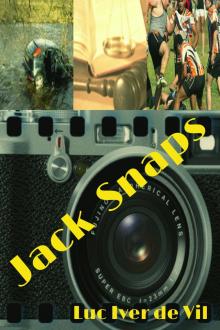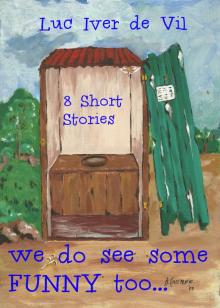- Home
- Luc Iver de Vil
We Do See Some Funny Too... Page 2
We Do See Some Funny Too... Read online
Page 2
the loose end to the side of my stretcher. The second line I hooked to ‘The Man’s’ blankets, tied it to the other side of my bed. I covered both lines with sand so that they could not be seen.
Once in bed I waited, I waited to hear his breathing change to that of a man sleeping. Then I gave the string attached to his blankets a firm tug, and his blankets came flying off. He woke with a start, sat up and cursed under his breath. After a short while he pulled his blankets up and lied down. I pulled the other string and rattled the cans. Upright he sat again! After a longer time he settled again, and I immediately whipped his blankets off.
Could ‘The Man’ curse! He jumped up, stumbled through the sand and out the door. I turned on my side and went to sleep, mission accomplished.
In the morning I found him sitting upright in the Land Rover, with all doors locked. I acted as if all was normal and made breakfast, while he remained where I found him. Due to him not feeling well he declined breakfast, and made me break camp and load all by myself. I did not mind.
Suddenly ‘The Man’ remembered a very important meeting he had to attend to the next day back in Johannesburg, and I had to rush him to the Airport near Windhoek. I gladly obliged.
Weeks later when enquiring about the investment coming from this Mining House, Head Office told me that the money was invested in Super-natural research instead.
I was relieved, the ghosts of the Namib was safe for another short while.
THE FUNERAL AT SEA
Funerals, and weddings, are pretentious affairs. Family and friends get together too fain mourning or merriment, and then consume as much food and drink as they can, after the fact.
Once I did attend a funeral, as I was duty bound, where the sorrow was genuine, but not for the departed, it was self-centred.
I was “Communications Operator’ in the navy. This meant that I spent my time on the flag deck of a warship, in good weather and foul, signalling “what ship where from where bound” to any passing vessel.
Two members of the senior service had died, one in an argument on his motorcycle with the Simons Town train, the other off over-eating and drinking. Both had requested to be buried at sea.
On the day of the funeral I was on duty, donned my all-weather coat and took station on the flag deck, to observe proceedings.
I must explain how a funeral at sea is done. The Quartermaster builds a wooden shoot, which is attached to the side of the ship, on the quarter deck, at a forty-five degree angle. On this shoot the coffin, slightly weighted, is tied with the naval ensign draped over it. When the time has come, a rope is pulled, the slip knot untangles, and the coffin slides overboard, from under the ensign. On this particular day the quartermaster had to build and install two shoots.
It was typical Cape weather that Saturday, a nasty cold wind blew with a drizzle slanting in, making everything wet and slippery. The first bit of disaster happened when the coffins arrived. The gangplank was wide enough for the coffins, but not wide enough to accommodate the sailors carrying them as well. So the quartermaster had a rope attached to the coffins and dragged them aboard. Unfortunately the over-eaten guy was a bit heavy, the rope snapped and he slid all the way back to the cay. The resultant crack in the coffin was quickly covered some tape by a fresh coat of varnish. Luckily no family member observed this hasty repair, so no damages claim was instituted.
Fitting the coffins to the shoots went without a hitch, although I did note a bit of a wobble in one.
Then the family and friends started arriving, fancily dressed, shivering in the cold and wet, looking rather miserable, as they boarded. All the crew who was not employed on essential duties to run the ship, was dressed up in their Number One White Suits, and had to stand in guard of honour, saluting, at attention, or at ease, as commands were yelled. I am sure my comrades wished that the one guy was a better biker, and the other a lesser eater, and then this awful day would not have dawned.
When the ship left the harbour, and the waves started rocking the boat, many of the family and friends forgot about the food waiting for them at the after-funeral-party, and started feeding their breakfasts to the fish, over the side of the ship.
The Chaplin could not go to the side of the ship; he had the job of recommending the departed’s souls to the angels, who I believe were the only individuals, the angles that are, actually listening. So after every sentence he pulled a face, and re-swallowed his bacon and eggs, sunny-side up.
A loud crack, a crash and one of the shoots disappeared over the side, floating in the waves with the coffin still riding firmly on top. A ship cannot make a sudden stop, so we sailed forth, losing sight of the now freshly launched raft, with its load.
Not feeling at his best, the poor Chaplin got his ceremony into a bit of a mess too, mumbling about the already departed and the soon to be departed, although his clients had both actually departed a number of days ago! I think he meant to say "The one already fed to the fish, and the one soon to be fed to the fish!"
The second coffin was slid into the drink in the appropriate manner, without any hitch, and we set out criss-crossing the ocean searching for the floating corpse. What a disaster it would have been had it washed ashore on Sandy Bay, amongst the girls sunbathing in the nude! Such a sight would have woken the dead!
Now it was the crew hanging over the side, snickering with their eyes peeled for the floating shoot. After extending the misery of the Chaplin, the family and friends, for a few hours, we found the remnants of the shoot, it had turned over and ditched the coffin, or the Great Whites had jumped at it and turned it over!
Once back in Simon’s Town our relieved passengers went ashore, taking an oath that all who dared to die in future will be cremated, or be left to rot on the side of the road.
The Quartermaster? He was court marshalled, not for losing a shipmate, but for loosing naval property, the ensign that had disappeared with the coffin.
THE OUT HOUSE
You talk about toilets? Why, kids? The toilets you have today, even in the clubs, are the ultimate luxury compared to what we had.
Now you go in, lock the door, sit down, pay the taxes, wipe with soft tissue, flush and the business is done. For those so inclined there are even running hot water, soap and towels to wash your hands!
When I was your age we had three types of comforts; the farm, the town and the behind the nearest bush' toilet. In those days we were not allowed to use the word toilet, it was a four letter word spelled with six. Loo? That sounds like a cow with constipation!
We called them "Outhouses". The farm and town outhouses were similar, but also different, in many respects. On the farm you had to be a long distance runner, in town a good sprint would do, to get there in time. Both had big wooden boxes on which you sat, your feet dangling way above the floor, with a round hole cut in the strategic place, through which you did your relieve work.
If you wiggled around, you got a ring of splinters, be you in town, be you on the farm. Mothers always kept a sharp needle handy in the kitchen, for that delicate 'removal of the slithers of pine' operation.
The farm latrine had to be built out of warpy planks, and the roof had to leak when it rained. Otherwise it would not have been a proper lavatory. The door, also bent planks nailed together, painted green, had to creek, fit skew and would not move without muscle power.
In these modern times they tell you about all the germs that lurk in 'facilities'! Man, in my childhood there were a lot more things than invisible bugs residing in outhouses!
Each bog had its own tribe of daddy-long-leg spiders, with flatty, stripy, spotty and fatty immigrants thrown in for variety. And the lizards, they darted in and out through the cracks in the walls and doors. A residing family of frogs was the norm, with mice and rats making regular appearances.
Bees and wasps constantly fought aerial battles within the limited air space. Imagine what would have happened if a dog fight took them down into the darkness, through the hole in the box, and they then suddenly found their
only exit blocked by your soft backside?
Bats live in caves! There was no reason why they should not have moved into the dark cavern dug into the earth. Your rear-end could have been in trouble closing the single opening to their home, and dropping bombs into it too!
Snakes, those who had colds and blocked noses and couldn't smell, also loved the warmth of the privy, to recover from the flu, I guess.
Even then the newspapers were good for one thing only, and were actually used them for that, torn into little squares hanging from a nail.
A farm WC was built over a dug hole. You could tell if the farmer was rich or poor, counting off the time it took from the release to the splash. If it was a considerable period you knew the farmer was rich, and had many labourers’ to dig deep. A poor farmer only had one or two workers, so, a much shallower hole.
Those days Grandfathers, and fathers, always asked for blessings from above before each meal. To me their timing was totally wrong; we needed those blessings much more when the food remnants departed the body on the other side.
One never lingered on the can. You went in, got your bowels to move quickly, apologized to the wild life and got out.
Visiting there at night time was a frightening affair. The outhouse's torch batteries had to be dead, that was a given. Candles you say? Have you ever tried to keep a candle burning running

 The Hillbrow Election, 1987
The Hillbrow Election, 1987 Jack Snaps
Jack Snaps We Do See Some Funny Too...
We Do See Some Funny Too...